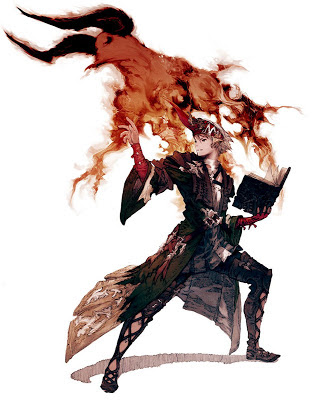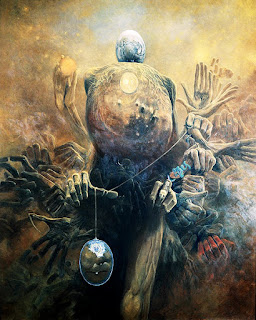Warlock, a class for Lamentations of the Flame Princess
HP, XP, and Saving Throws as Magic-user
Albion crawls with failed divinity: fallen angels, dethroned fairy queens, rogue incubi, all the exiles and rejects of Faerie and the Hereafter. While most look upon these beings as gods or demons, to be feared or adored, warlocks are those cunning or foolish individuals who instead see opportunity. Eschewing the hard study of magicians and the enlightenment of clerics, warlocks rely on their talent as rhetors to broker deals with these beings. All power they gain is through trade, and so they must constantly perform servies or find payments for their patrons. This struggle often pushes warlocks into the ranks of Albion’s freelancers and mercenaries.
The locus of a warlock’s magical power is her contract, which contains the seals and signatures of every spirit with which she has formed a pact. Contracts describe the kinds of requests signatories will grant, as well as the kinds of tasks the warlock will perform in return. Signatories reward warlocks who have proved their worth and make a greater range of favors available as they gain levels.
A warlock starts with a contract with a single spirit. She may add any number of spirits to her contract, but must first find them and make them signatories, usually in return for a some sort of service.
A warlock can request favors from her signatories as often as she wishes. However, spirits are fickle; they may grant the request without question, demand payment, or punish the warlock for pestering them unless appeased in some way. Warlocks do not need to settle their debts to signatories immediately, but outstanding obligations sour a spirit’s disposition and make it more difficult to extract favors from them.
Signatory: Old Queen Mab
She was ancient when the heath lay deep beneath the sea.
Sphere: Curses
As the sometime Queen of Faerie, Mab above all else desires revenge against the King of Roses Red, who deposed her, and the supposed allies who let him. When she speaks with her vassals, she seizes control of a nearby animal or weak-willed human and speaks through their mouth.
The Curse of Many Lances
Prerequisite: 1st level Warlock
Mab inflicts a curse of the warlock’s design that pertains to lances, bleeding, wounds, or impalement.
The Curse of Stitched Eye
Prerequisite: 3rd level Warlock
Mab inflicts a curse of the warlock’s design that pertains to dreams, insomnia, sleep, or sleep walking.
The Curse of Eternal Darkness
Prerequisite: 5th level Warlock
Mab inflicts a curse of the warlock’s design that pertains to darkness, night, occlusion, or the color black.
The Curse of Chains
Prerequisite: 7th level Warlock
Mab inflicts a curse of the warlock’s design that pertains to bondage, chains, imprisonment, limitation, or servitude.
The Curse of Changed Flesh
Prerequisite: 9th level Warlock
Mab inflicts a curse of the warlock’s design that pertains to metamorphosis or any other sort of bodily transformation.
For the Referee
When a warlock calls on their signatory, the Referee makes a reaction roll to determine their initial disposition. Most favors should be no more effective than a spell a magician of the warlock’s level could cast. If they are more powerful, apply a penalty; signatories should grant extravagant requests either in modified form or in return for very difficult or dangerous services.
Feel free to apply bonuses or penalties based on the situation—favors that align with a signatory’s goals (or at least amuse them) might get a bonus, while those that offend a signatory’s sensibilities might receive a penalty.
- Malicious: The signatory harms the warlock or otherwise complicates their situation in a manner pertaining to their Sphere, and the warlock takes a -1 penalty to the next reaction roll with this signatory
- Annoyed: The signatory harms the warlock or otherwise complicates their situation in a manner pertaining to their Sphere
- Bored: The signatory does nothing.
- Interested: The signatory is inclined to grant the warlock’s request
- Cooperative: The signatory is inclined to grant the warlock’s request, and the warlock gains a +1 bonus to the next reaction roll with this signatory.
Once the Referee has made the reaction roll, the warlock must actually convince their signatory to perform the favor. This proceeds like any other conversation with an NPC. The warlock says what they want, the signatory states their price, and then they haggle. However, this requires a great deal of extemporizing, so here is a heuristic to use if you get stuck:
There are three broad classes of things signatories want: Sacrifices, Rituals, and Services. Agreeing to perform a Ritual or Sacrifice each increases a signatory’s reaction by 1 step. Agreeing to perform a Service has a variable effect, depending on its difficulty and complexity, but a Service that takes a session to complete should increase the signatory’s reaction by two steps.
Warlocks do not need to perform Sacrifices, Rituals, or Services immediately, but for every outstanding Ritual or Sacrifice, the warlock takes an cumulative -1 penalty to signatory reaction Rolls. Services cause a -2 penalty to signatory reaction rolls.
Rituals
When a warlock offers to perform a Ritual in negotiation, roll on the following table to determine which the signatory wants.
Performing a ritual takes 1 Turn and requires chalk and incense.
- Perform a ritual over the body of a recently slain foe, claiming their soul for the signatory.
- Perform a ritual to summon an agent of the signatory into the area.
- Perform a ritual to banish a rival’s influence from the area.
- Perform a ritual to attune the area to the signatory’s sphere.
- Perform a ritual to erase all evidence of the signatory’s meddling.
- Capture someone nearby and compel or convince them to swear a binding oath, making them an agent of the signatory.
Sacrifices
When a warlock offers to perform a Sacrifice in negotiation, roll on the following table to determine which the signatory wants.
Sacrifices take 1 Round. Sacrificing a live, healthy goat (1 Turn) takes the place of any Sacrifice.
- Blood: d6+level damage
- Flesh: d4 Strength damage
- Grace: d4 Dexterity damage
- Judgment: d4 Wisdom damage
- Nous: d4 Charisma damage
- Time: incapacitated for d6 Turns
- Vigor: d4 Constitution damage
- Wit: d4 Intelligence damage
Services
Queen Mab’s services usually involve some of the following:
Objects
- Explosives
- Poison
- Regalia
- An exquisite meal
- A curse
- An ancient and enchanted weapon
- A treaty from times primeval
- A parasol
- A gown
- A rose
People
- A spy
- A knight
- A child
- A cook
- A maid
- A shepherd
- A lord or lady
- An ambassador
- A magician
- The King of Roses Red
Incidents
- Sabotage
- Assassination
- Marriage
- Sowing the earth with salt
- Framing someone for a crime
- Transformation
- Defenestration
- Decapitation
- Burial
- A feast
Locations
- A busy kitchen
- A terrible prison
- A haunted barrow
- A decaying castle
- A splendid ballroom
- The cold and empty moor
- The Kingdom of Faerie
- A moonlit glade
- A backwater village
- A haberdashery
Dispositions
- A hated rival
- A friend betrayed
- A wrathful widow(er)
- A murderous parent
- An erstwhile ally
- An aging guardian
- A fading beauty
- A vengeful victim
- An old friend
- A loyal servant








